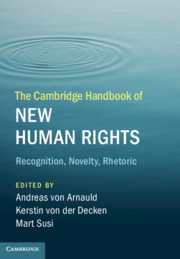36 results
Part V - Autonomy and Integrity Rights
-
- Book:
- The Cambridge Handbook of New Human Rights
- Published online:
- 04 January 2020
- Print publication:
- 02 January 2020, pp 359-460
-
- Chapter
- Export citation
Introduction
-
-
- Book:
- The Cambridge Handbook of New Human Rights
- Published online:
- 04 January 2020
- Print publication:
- 02 January 2020, pp 1-4
-
- Chapter
- Export citation
The Right to Be Forgotten
- from Part IV - New Technology Rights
-
- Book:
- The Cambridge Handbook of New Human Rights
- Published online:
- 04 January 2020
- Print publication:
- 02 January 2020, pp 285-308
-
- Chapter
- Export citation
Copyright page
-
- Book:
- The Cambridge Handbook of New Human Rights
- Published online:
- 04 January 2020
- Print publication:
- 02 January 2020, pp iv-iv
-
- Chapter
- Export citation
The Right to a Clean Environment and Rights of the Environment
- from Part II - Public Good Rights
-
- Book:
- The Cambridge Handbook of New Human Rights
- Published online:
- 04 January 2020
- Print publication:
- 02 January 2020, pp 135-136
-
- Chapter
- Export citation

The Cambridge Handbook of New Human Rights
- Recognition, Novelty, Rhetoric
-
- Published online:
- 04 January 2020
- Print publication:
- 02 January 2020
Part VI - Governance Rights
-
- Book:
- The Cambridge Handbook of New Human Rights
- Published online:
- 04 January 2020
- Print publication:
- 02 January 2020, pp 461-562
-
- Chapter
- Export citation
The Right to Mental Integrity
- from Part V - Autonomy and Integrity Rights
-
- Book:
- The Cambridge Handbook of New Human Rights
- Published online:
- 04 January 2020
- Print publication:
- 02 January 2020, pp 385-412
-
- Chapter
- Export citation
Part III - Status Rights
-
- Book:
- The Cambridge Handbook of New Human Rights
- Published online:
- 04 January 2020
- Print publication:
- 02 January 2020, pp 163-258
-
- Chapter
- Export citation
The Right to Internet Access
- from Part IV - New Technology Rights
-
- Book:
- The Cambridge Handbook of New Human Rights
- Published online:
- 04 January 2020
- Print publication:
- 02 January 2020, pp 261-284
-
- Chapter
- Export citation
The Right to Health
- from Part II - Public Good Rights
-
- Book:
- The Cambridge Handbook of New Human Rights
- Published online:
- 04 January 2020
- Print publication:
- 02 January 2020, pp 105-134
-
- Chapter
- Export citation
The Right of Access to Law
- from Part VI - Governance Rights
-
- Book:
- The Cambridge Handbook of New Human Rights
- Published online:
- 04 January 2020
- Print publication:
- 02 January 2020, pp 539-540
-
- Chapter
- Export citation
Index
-
- Book:
- The Cambridge Handbook of New Human Rights
- Published online:
- 04 January 2020
- Print publication:
- 02 January 2020, pp 563-578
-
- Chapter
- Export citation
Part I - Cross-Cutting Observations
-
- Book:
- The Cambridge Handbook of New Human Rights
- Published online:
- 04 January 2020
- Print publication:
- 02 January 2020, pp 5-50
-
- Chapter
- Export citation
Reproductive Rights
- from Part IV - New Technology Rights
-
- Book:
- The Cambridge Handbook of New Human Rights
- Published online:
- 04 January 2020
- Print publication:
- 02 January 2020, pp 309-332
-
- Chapter
- Export citation
The Right to Good Administration
- from Part VI - Governance Rights
-
- Book:
- The Cambridge Handbook of New Human Rights
- Published online:
- 04 January 2020
- Print publication:
- 02 January 2020, pp 491-514
-
- Chapter
- Export citation
Rights to Gender Identity
- from Part III - Status Rights
-
- Book:
- The Cambridge Handbook of New Human Rights
- Published online:
- 04 January 2020
- Print publication:
- 02 January 2020, pp 191-214
-
- Chapter
- Export citation
Rights Relating to Enforced Disappearance
- from Part V - Autonomy and Integrity Rights
-
- Book:
- The Cambridge Handbook of New Human Rights
- Published online:
- 04 January 2020
- Print publication:
- 02 January 2020, pp 413-436
-
- Chapter
- Export citation
Rights of Older Persons
- from Part III - Status Rights
-
- Book:
- The Cambridge Handbook of New Human Rights
- Published online:
- 04 January 2020
- Print publication:
- 02 January 2020, pp 165-190
-
- Chapter
- Export citation
The Right to Freedom from Corruption
- from Part VI - Governance Rights
-
- Book:
- The Cambridge Handbook of New Human Rights
- Published online:
- 04 January 2020
- Print publication:
- 02 January 2020, pp 515-538
-
- Chapter
- Export citation



